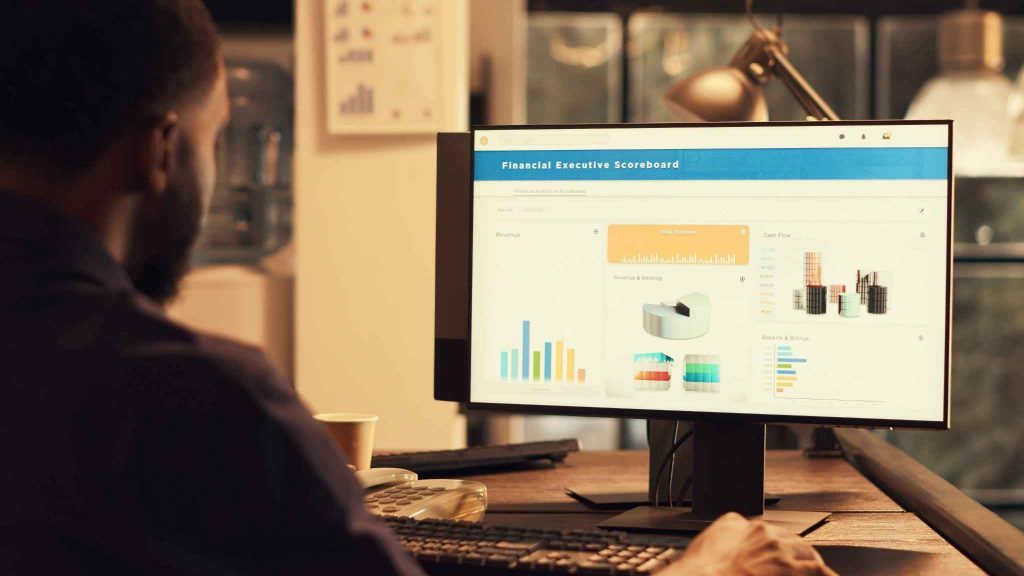In the rapidly shifting world of business technology, terms like ERP and SAP are tossed around so frequently that their true meanings can sometimes get lost in the noise. If you’ve ever found yourself wondering what sets these two apart or how they work together to power modern enterprises, you’ve landed in the right spot.
This guide will break down the complex world of enterprise resource planning and shed light on what makes SAP a standout player in this space. We’ll explore their differences, dive into key features, and help you understand which solution fits your business needs best.
What’s ERP?
ERP or Enterprise Resource Planning is a type of business management software. It helps organizations integrate and streamline core processes like finance, accounting, inventory, and customer relationship management. By connecting these functions, an ERP system creates a unified way to manage your entire enterprise.
This enterprise-level software acts as a centralized platform that supports data sharing and collaboration across different departments. It provides real-time access to accurate and up-to-date information, helping managers and executives make informed decisions quickly.
With ERP software, businesses can automate repetitive tasks, boost efficiency, and reduce costs. This leads to improved productivity, faster decision-making, and stronger growth in a competitive market.

Key Characteristics
- Integrates and streamlines core business processes including finance, accounting, retail management, field service, inventory, reporting, customer relationship, and manufacturing
- Acts as a centralized, unified platform for data sharing and collaboration among departments
- Offers real-time access to accurate and up-to-date information for better decision-making by managers and executives
- Automates repetitive tasks to free resources for strategic initiatives
- Helps optimize operations, reduce costs, and enhance overall productivity
- Supports growth and improves competitiveness in the market
What’s SAP?
SAP stands for Systems, Applications, and Products in Data Processing. It is a German multinational software corporation known for developing and marketing enterprise solutions. Many ask, “Is SAP an ERP system?” The answer is yes, SAP’s ERP software is among the most widely used globally.
SAP’s ERP systems offer a comprehensive integration platform that unifies finance, logistics, human resources, and customer relationship management. This makes SAP a leader when it comes to SAP ERP comparison with other vendors. Its solutions help businesses run operations efficiently and effectively.
Besides its flagship ERP, SAP provides industry-specific and specialized software tailored for sectors like retail, healthcare, and manufacturing. Their cloud-based, flexible, and scalable platforms help companies streamline processes and support strategic growth initiatives.
Key Characteristics
- SAP stands for Systems, Applications, and Products in Data Processing
- A German multinational software corporation specializing in enterprise solutions
- Yes, SAP is an ERP system widely recognized for business management software
- Offers comprehensive ERP systems integrating finance, logistics, human resources, and customer relationship management
- Enables unifying and seamless exchange of data across departments to enhance decision-making and performance
- Key player in SAP ERP comparison with robust, scalable cloud-based and industry-specific solutions
- Provides specialized software for sectors like retail, healthcare, and manufacturing
- Delivers platforms that help businesses streamline, optimize, and improve productivity
- Supports evolving needs through flexible systems that promote strategic growth initiatives
Differences Between ERP and SAP
People often use the terms ERP and SAP interchangeably, which causes confusion. It’s important to understand that ERP is a broad category of business management software. Meanwhile, SAP is a company that develops and offers its own ERP systems and products.
When comparing ERP and SAP, remember SAP is just one provider among many in the ERP market. Alternatives like Microsoft Dynamics and Oracle offer different features, functionalities, and pricing models. Choosing the right solution depends on your organization’s needs, budget, and long-term goals.
Vendor versus Category
ERP refers to the category of software designed to integrate business processes. It covers systems from many vendors that help organizations manage finance, inventory, and more. On the other hand, SAP is a software company known as a major provider of ERP systems and solutions.
Understanding this key difference helps avoid confusion when discussing ERP software options. SAP’s flagship ERP product is widely utilized, but it’s only one option in a galaxy of ERP systems.
Features and Customization
Different ERP providers offer unique features and levels of customization. SAP’s architecture supports comprehensive integration and is highly customizable to fit complex business needs. Other ERP systems, like those from Oracle or Microsoft Dynamics, may offer simpler or more specialized options.
When comparing functionality, look at how each system handles integration, workflow automation, and scalability. This helps organizations pick software that best aligns with their operational demands.
Investment and Implementation
Implementing SAP or any ERP system involves significant investment. SAP projects can be complex with longer timelines and higher costs due to customization and training needs. Meanwhile, some ERP alternatives might offer quicker, less costly implementations, ideal for smaller budgets.
Organizations should assess not only initial costs but also ongoing support and total cost of ownership when choosing an ERP solution.
Target Market
SAP’s ERP solutions often target enterprise-level organizations with complex, global operations. Smaller to medium businesses (SMBs) may find alternatives like Microsoft Dynamics better suited to their scale and budget.
Choosing an ERP depends on company size, industry, and growth ambitions. It’s crucial to evaluate which system best fits your organization’s profile and future plans.
Integration and Flexibility
Modern ERP systems offer varying options like cloud-based or on-premise deployments. SAP provides both but is known for its scalable, flexible platforms supporting complex organizational workflows. Other ERP vendors may focus more on cloud-first or simpler setups.
Scalability and integration capabilities should match your business model and technology strategy for long-term success.
Support and Community
SAP benefits from a vast support network including global vendor teams, extensive training, and a large user community. This ecosystem provides knowledge bases, forums, and third-party partners.
Other ERP providers also offer strong support but may vary in community size and resources. Robust vendor and community support is key for smooth ERP adoption and ongoing optimization.
ERP or SAP for Your Business?
Choosing between SAP vs ERP solutions is a key part of your business strategy and digital transformation quest. Both management systems offer powerful tools and platforms to optimize your operations and workflows.
To conquer this complex realm, you need to uncover the secrets of each system’s architecture and structure, then select what truly aligns with your goals.

What to Consider?
- Strategic alignment with your goals: Your choice must fit your business strategy and future growth. Assess how the ERP’s platform architecture supports your optimization and long-term vision.
- Workflow needs, budget constraints, feature requirements: Examine your unique workflows and necessary features. Weigh these against your budget to find the best management system without overspending.
- Vendor evaluation strategies: Evaluate vendors’ offerings, support, and ecosystem strength. Look for flexible, scalable solutions that grow with your organization and meet evolving requirements.
By focusing on these factors, you’ll better understand the difference between SAP and ERP and confidently answer “Which to choose” for your business’s success.
Benefits of SAP ERP
Choosing SAP ERP brings many benefits that drive enhanced efficiency across your business. Its real-time data capabilities improve decision-making and help adopt industry best practices.
By leveraging cutting-edge innovation and advanced technologies, SAP offers unmatched flexibility and scalability to boost productivity and support your company’s strategic growth.
- Enhanced Efficiency in Procurement Processes: SAP smoothens procurement workflows, reducing delays and errors. This leads to greater efficiency and cost savings in supply chain operations.
- Real-Time Data Access and Decision Making: Access to accurate, real-time information empowers managers to make faster, better-informed decisions. This drives business agility and responsiveness.
- Adoption of Best Practices: SAP embeds proven industry best practices into its modules, helping businesses standardize processes and improve overall performance.
- Innovation Through Advanced Technologies: Continuous integration of new technologies like AI and automation fosters innovation, optimizing operations and creating competitive advantages.
- Scalability and Flexibility: SAP’s scalable architecture adapts to business growth, while its flexible design supports evolving workflows and diverse organizational needs.
Essential Steps in SAP ERP Implementation
Successful SAP ERP implementation starts with a clear plan and strong teamwork. Following these key steps ensures your strategic initiatives meet defined goals and objectives.

Define Goals and Objectives
Begin by setting clear goals and objectives for what your organization wants to achieve. This focus guides the entire implementation process toward measurable success.
Engage Key Stakeholders
Involve all relevant stakeholders early on to align expectations and secure support. Their input shapes workflows and drives smoother adoption.
Assemble a Balanced Team
Build a team with diverse skills from IT, operations, and management. A well-rounded team ensures all aspects of the system are covered effectively.
Prepare Data Thoroughly
Clean and organize your existing data before migration. Accurate data is critical for seamless integration and reliable reporting.
Comprehensive Training for Users
Provide thorough training for all users to empower them with knowledge. Well-trained staff enhance productivity and maximize system benefits.
Final Thoughts
SAP remains a leading ERP provider with powerful features and broad industry reach. However, every organization’s needs, goals, and growth plans are unique.
It’s essential to carefully evaluate all ERP solutions, considering factors like functionality, scalability, and budget. Companies like RT Dynamic offer expert integration services that help tailor and connect ERP systems smoothly.
Choosing the right ERP is a strategic journey so explore your options fully to find the best fit for your business success.
FAQs
Q1: What is the difference between SAP and ERP?
SAP is a specific ERP system developed by a German multinational company. ERP is a broad category of business management software designed to integrate core business functions. Understanding this difference helps in choosing the right solution for your organization.
Q2: Is SAP an ERP system or something else?
Yes, SAP is an ERP system. It offers comprehensive software solutions that unify finance, logistics, HR, and other business operations. SAP stands out for its industry-specific and scalable offerings.
Q3: How does SAP ERP compare to other ERP software?
The SAP ERP comparison shows SAP excels in integration and industry-specific features. However, alternatives like Microsoft Dynamics and Oracle also offer strong customization, pricing models, and scalability, depending on business needs.
Q4: How to decide between SAP and other ERP solutions for my business?
Choosing between SAP vs ERP solutions depends on your business size, budget, workflows, and strategic goals. Evaluating vendor offerings and integration options is key to optimizing your enterprise resource planning journey.



